The Golden Dawn or Thoth Method
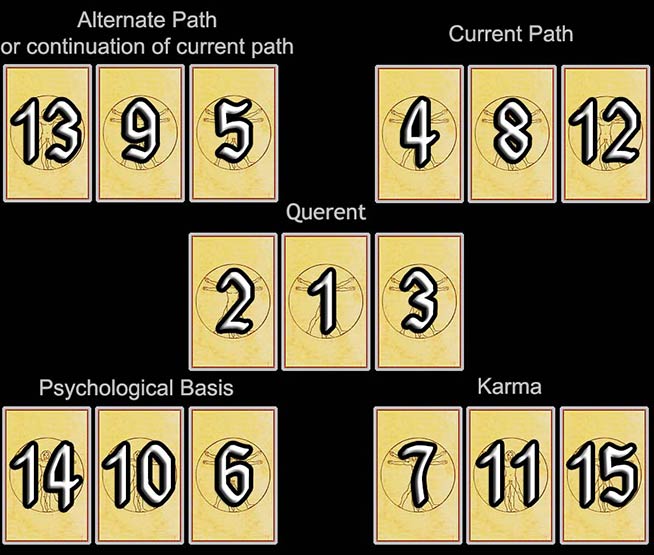
Difficulty: Complicated
Note: Tarot decks that use reversed cards such as the Rider-Waite do not work well with this spread, which was designed to be read using elemental dignity.
The Golden Dawn spread is best suited for use with the bifrost Tarot and especially the Book of Thoth, as these decks are meant to be read a certain way with the court cards. Princes and queens represent actual men and women connected with the matter, while princesses generally represent ideas; thoughts or opinions, and knights represent arrival or departure of a matter depending on the direction faced.
In this tarot spread, particular attention should be paid to a card's exact position in relation to its neighbours. Whether the neighbour cards bear the same energy (suit) determines whether a card is considered well-dignified or ill-dignified. Opposite suits ill-dignify each other, while other suits are considered friendly. Tarot cards of the same suit or element strengthen each other.
As with other tarot spreads, it is important to count the cards' tendencies, such as whether there is a lot of one particular suit or number pattern. The patterns reveal special messages. Having several majors present indicates higher forces at work, several cups suggest strong emotions, etc.
Card #1 represents the reader and the nature of the topic at hand.
Cards #2 & #3 are read in extension of #1 to further comprehend the nature of the topic.
The two sets of three tarot cards at the top of the spread represent chronological sets of events. The current path as it would unfold naturally is represented by cards #4, #8, & #12. The alternate path that could be taken is represented by cards #13, #9, & #5. However, if the reader gets the feeling these cards are telling them they go together, then the alternate path is to be considered an extension of the current path, and to be read chronologically in this order: #4, #8, #12, #13, #9, #5. Just keep in mind: this is only if the two paths seem particularly similar.
Cards #14, #10, & #6 shed light upon the psychological undertones of the current issue.
Cards #7, #11, & #15 represent the influences of karma and destiny beyond the reader's control. These cards suggest adapting to this, as fate.
Your Golden Dawn Reading
| The Alternate Path (or Extension of Current Path) |
Your Current Path |
|||||
X – The Wheel of Fortune |
V – The Hierophant |
IX – The Hermit |
XII – The Hanged Man |
XI – Justice |
XXI – The World |
|
| The Querent | ||||||
III – The Empress |
VI – The Lovers |
XVIII – The Moon |
||||
| The Psychological Basis | Karma | |||||
XV – The Devil |
VII – The Chariot |
0 – The Fool |
XX – Judgement |
XVI – The Tower |
XIX – The Sun |
|
The Querent
cards represent the querent and the nature of the topic at hand. The first card (in the center of the spread) represents the very core of the matter, and the other two cards around it are added to it in order to further comprehend the nature of the topic.
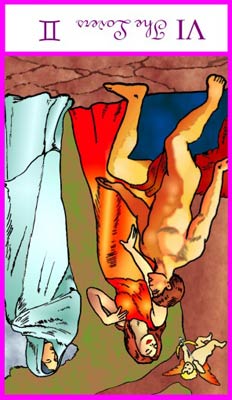
A relationship ending or turning sour (it may or may not be romantic). 'Star-crossed lovers;' an ill-fated relationship. The inability to make a choice for any number of reasons – fearing to commit to a decision, being indecisive, or having inner conflict. Choosing the 'low road' in life.
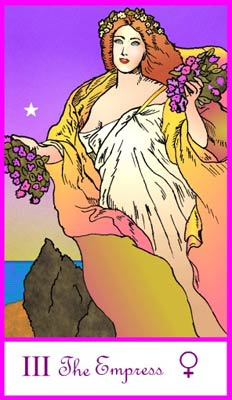
The Mother archetype, which implies mothering qualities such as nurturing, compassion, devotion, creativity, and fertility. An endeavour is coming to fruition. Love and sexuality. Hard work that pays off.
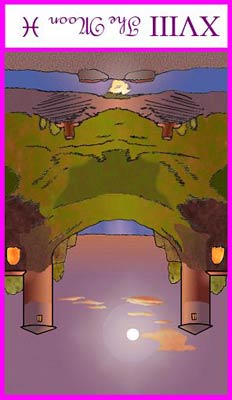
Finding out what is really going on. Something that was unclear or ambiguous is now understood. Uncovering or revealing deceit, dishonesty, and self-deception. Experiencing romance. Looking into the mysteries of life. Letting your imagination run free, which may lead you to new insights and discoveries. Finding hidden messages or meaning in your dreams.
Your Current Path
cards represent your current path as it would unfold naturally. These cards are read in chronological order from left to right.
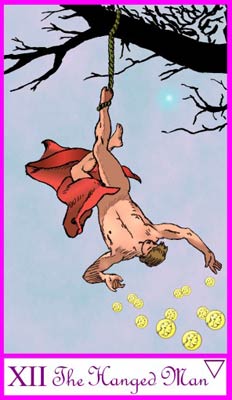
Patience. Humility. Making a small sacrifice so that a larger gain might be made. Seeking redemption. Entering a 12-step program. 'Letting go and letting God'. A unique perspective on a situation. Putting a project on hold in order to properly evaluate the situation.
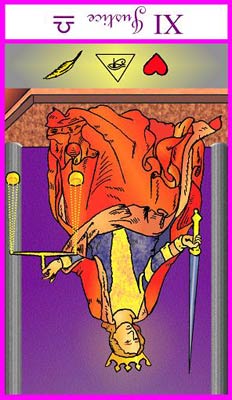
Lack of self-discipline is creating problems. Being a bully or feeling bullied by others. Being overbearing or bossy. Lacking integrity and moral fortitude. Yielding to base instincts such as greed and jealousy. Seeing the worst in others.
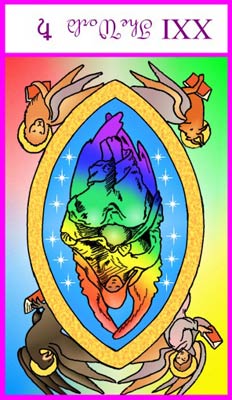
An unwillingness or inability to finish a job. Unfinished business in your life needs to be attended to. A need to tie up loose ends and finally put something to rest. Feelings of boredom or powerlessness. Bridling at constraints that have been imposed on you. 'Living in your own little world'.
The Alternate Path
cards represent the alternate path that you could choose to take in lieu of the Current Path. However, if the cards that come up seem to indicate that they go along with the Current Path, these three cards should be interpretted not as an Alternate Path, but as a chronological extension of the Current Path (also read from left to right).
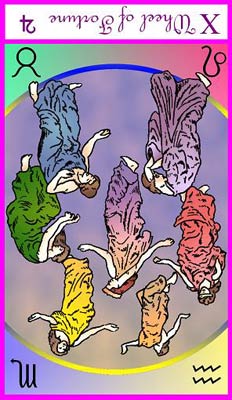
Delay in new beginnings or missing out on new opportunities. Having resistance to change. Unexpected problems and obstacles. Fate is not smiling at you right now. 'Shit happens' but 'this too shall pass'. Getting caught up in the dramas of life.
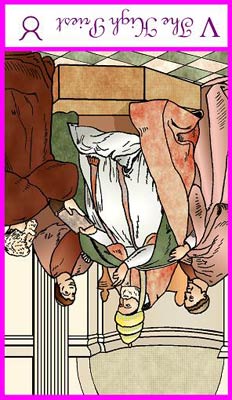
Taking a non-conformist or unconventional approach. Blindly following someone else's advice. Being closed-minded. Someone who is obsessive compulsive or does doing everything by the book. Being sacrilegious or irreligious.
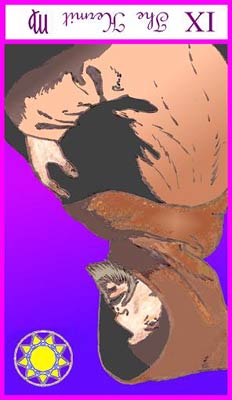
Someone has been too withdrawn, antisocial, or introverted and would benefit from the company of others. Loneliness or aloofness. Isolation from people who might provide help or useful guidance. Feeling ostracised, left out.
The Psychological Basis
cards shed light upon the psychological undertones of the current problem.
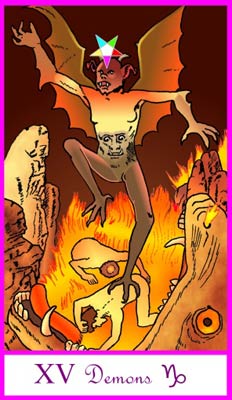
Materialism or superficiality. Negative thinking. A dysfunctional relationship. Being self-destructive or caught in a bad situation of your own making through vices such as greed, addictions, or hubris. Giving in to temptation. Feeling like you're going through Hell. Egotistical power struggles. Dealing with someone you think is evil, although s/he may be merely exhibiting shortcomings that you have but don't want to face in yourself.
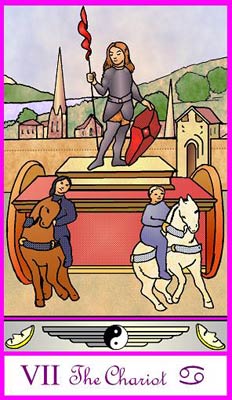
Taking control of conflicting forces within a project. Moving forward despite these conflicting forces. Using strength of will to get things done. Taking personal responsibility for something. A positive outcome is suggested.
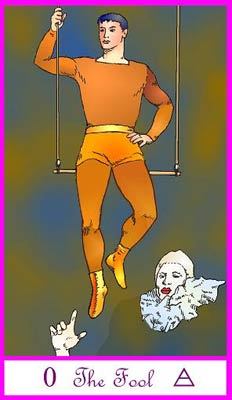
A time to begin something new, especially when done without bias or preconceived notions. 'Leap and the net will appear'. Keep an open mind. A situation with promise or potential. 'Beginners luck'.
Karma
These cards represent the influences of karma and destiny that are beyond your control. They suggest adapting to this fate.
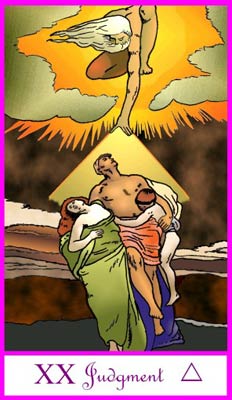
Renewal, regeneration, and (metaphorical) rebirth. Hearing a calling; experiencing an epiphany. Exhibiting good judgment. Thinking 'outside the box'. Forgiving someone who has wronged you. Opening a new chapter in life or passing a significant milestone.
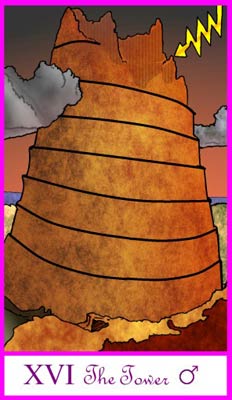
The collapse of a project or situation, especially when it forces you to revaluate your core values. Someone who challenges your beliefs or forces you to revaluate your life. Being forced out of your comfort zone. Losing your temper, i.e., blowing your top.
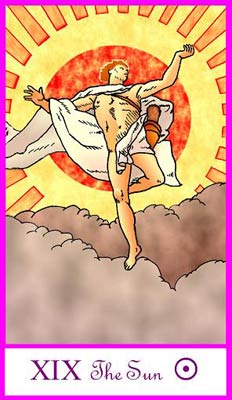
Enjoying or celebrating success. Having energy and vitality, being optimistic and active. Triumph over obstacles. Recognition for work done. Trusting others and experiencing a sense of unity. Coming out of a dark period. Critical reasoning leads to clarity and understanding.
